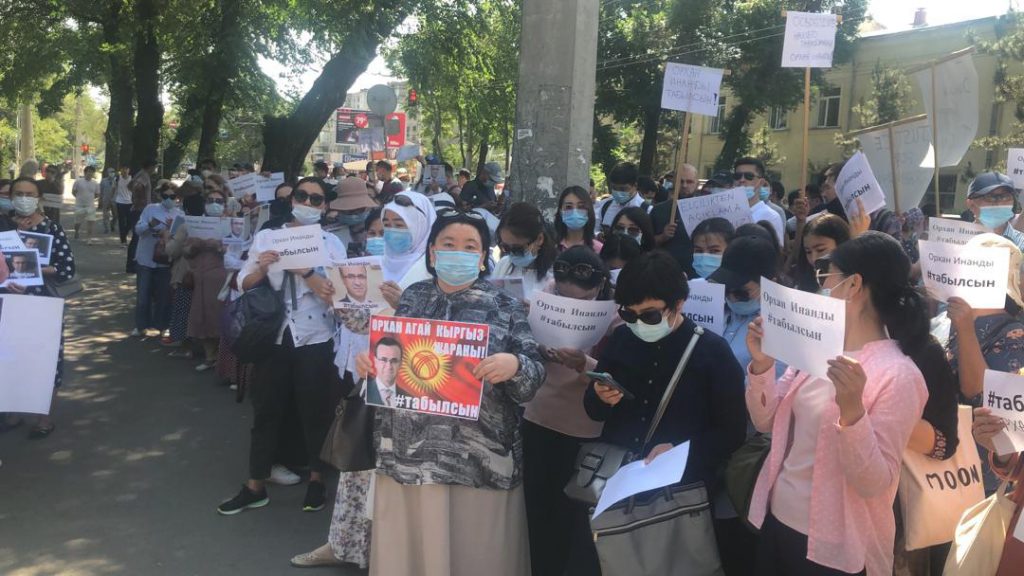Hundreds of people have been protesting since Tuesday in the Kyrgyz capital of Bishkek, demanding that authorities find the president of a prestigious school network in the country who is feared to have been abducted by Turkey’s spy agency.
Orhan İnandı, the founder and president of the Turkish-Kyrgyz Sapat school network operating in Kyrgyzstan, went missing in Bishkek on Monday evening and is feared to have been abducted by Turkey’s National Intelligence Organization (MİT) due to his alleged links to the Gülen movement.
Turkey claims the founder of the school network is Turkish Islamic cleric Fethullah Gülen, whose movement is accused by the Turkish government of masterminding a failed coup in Turkey in July 2016. The movement strongly denies any involvement in the coup attempt.
The Sapat (formerly Sebat) network of educational institutions has been operating in Kyrgyzstan since 1992. The school network has been run by the Kyrgyz Republic since 2017. İnandı had been working in Kyrgyzstan since 1995 and had been president of the schools since 2001. He has been a citizen of the Kyrgyz Republic since 2010.
İnandı’s alleged abduction by Turkey prompted many Kyrgyz including students and parents from the Sapat schools to hold protests, demanding the educator’s release. The protestors first gathered in front of the Turkish Embassy in Bishkek on Tuesday where they believe İnandı is held. They were carrying placards that read in Kyrgyz and Russian: “Where is Mr İnandı?” The protestors, meanwhile, blocked a black Mercedes that belonged to the embassy from passing through the crowd, thinking that İnandı might be in the vehicle. The vehicle had to return to the embassy.
On Wednesday, a group of protestors marched from the Turkish Embassy to the presidential palace where they called on the Kyrgyz president to make a statement about the whereabouts of the missing educator.
The Sapat schools’ general director Amir Sultanmuratov held a news conference on Wednesday asking the Kyrgyz authorities to find İnandı while praising the missing man for his contributions to the educational activities in the country.
“He made great efforts in the field of education and for the success of the Sapat schools. Thousands of students graduated from these schools, and Mr İnandı touched the lives of every one of them. Mr İnandı and his family had been unable to travel to their homeland for seven years due to political problems. We think he was abducted,” said Sultanmuratov as he called on Kyrgyz authorities and the people to help find İnandı.
In a press statement on Tuesday, İnandı’s wife Reyhan said she suspects her husband was abducted and taken to Turkey. “I am concerned for his safety,” she said.
In the meantime, Kyrgyz President Sadyr Japarov ordered the State Committee for National Security and the Ministry of Internal Affairs to conduct an extensive search to locate İnandı, according to a statement on the presidency website on Tuesday.
Turkish President Recep Tayyip Erdoğan has cracked down on alleged Gülen supporters, prosecuting more than 600,000 people, arresting 100,000 others and urging foreign governments to hand over suspects since the failed coup.
The İnandı incident follows the enforced disappearance of nearly 30 people with real or alleged links to the Gülen movement since the coup attempt.
Mostly recently, MİT arrested and brought back to Turkey Selahattin Gülen, a teacher and a nephew of Islamic scholar Gülen living in Kenya.
Some of the enforced disappearance victims in Turkey have spoken out in court after they were found in police custody, recounting the systematic and severe torture they were subjected to during their interrogation by government operatives, who, victims said, waited until their wounds had healed to hand them over to the police.
According to a recent report by Freedom House on global transnational repression Turkey has become number one among countries that have conducted renditions from host states since 2014. The Turkish government has pursued its perceived enemies in at least 30 host countries spread across the Americas, Europe, the Middle East, Africa and Asia since July 2016.
“Ankara’s campaign has primarily targeted people affiliated with the movement of religious leader Fethullah Gülen, which the government blames for the coup attempt,” the report said.



